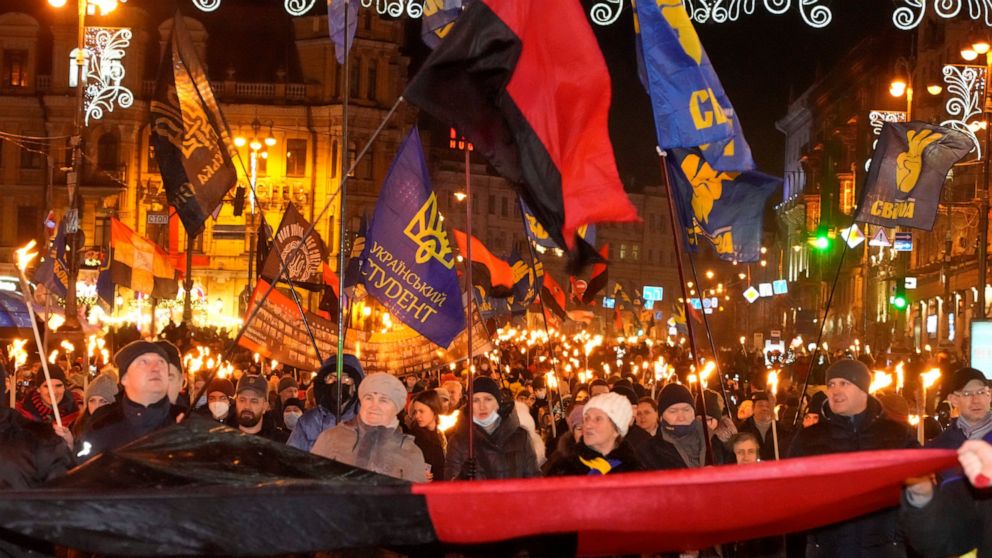Is Stepan Bandera’s birthday celebrated as a national holiday in Ukraine?

Every new year’s day far-right nationalists in Ukraine hold a torchlight march in Kiev to mark the birthday of their hero Stepan Bandera, the fascist leader notorious for his collaboration with the Nazis during World War 2, whose followers in the Organisation of Ukrainian Nationalists directly participated in the Holocaust. Attendance at these events has declined over the years and most recently numbered in the hundreds, reflecting the low level of popular support for the far right.
If the cult of Bandera was restricted to the forces of organised fascism in Ukraine, it would be less of a problem. Unfortunately that isn’t the case. With “several dozen monuments and scores of street names glorifying this Nazi collaborator”, Bandera serves as a symbol of, and an inspiration for, the state-sponsored Russophobic ethnonationalism that was imposed on the country after elected president Viktor Yanukovych was driven from office in the Maidan uprising/coup of 2014.
This has resulted in the denial of political self-determination to the people of Donbass, through a refusal to implement the Minsk accords, and in the suppression of the language rights of the Russian-speaking minority still living under Kiev rule. More recently, under the presidency of the self-proclaimed defender of democracy Volodymyr Zelensky, political parties with a base of support among that minority have been banned and their assets confiscated on the grounds that they are “pro-Russian”, irrespective of their opposition to Putin’s invasion.
One shocking example of official endorsement of the Bandera cult was the Verkhovna Rada’s decision on 18 December 2018 to commemorate the 110th anniversary of Bandera’s birth. Described as “a leading figure and theorist of the Ukrainian national liberation movement”, Bandera was included on the list of “outstanding personalities” whose anniversaries were to be “celebrated at the state level” in 2019. As I wrote in a previous article, “the fact that a Nazi sympathiser implicated in the Holocaust received state recognition in this way should give pause to anyone inclined to accept the propaganda picture of pre-invasion Ukraine as a thriving liberal democracy”.
This was bad enough, but a distorted account of the Verkhovna Rada’s decision was almost immediately put into circulation which made it appear even worse. On 19 December the story was reported by Radio Liberty under the headline “Ukraine declares Bandera’s birthday an official holiday”, and also by TASS who went with “Nazi collaborator’s birthday declared official holiday in Ukraine”. In reality, as can be seen from the summary above, and by consulting the relevant documents on the parliamentary website (English translations here and here), no “official holiday” had been introduced in commemoration of Bandera’s birthday, or indeed any of the other anniversaries.
One person to be annoyed by this misleading story was Volodymyr Viatrovych, the then head of the Ukrainian Institute of National Memory and himself an admirer of Bandera. He complained that he had been approached by a journalist asking him to “comment on the decision of the Verkhovna Rada, which made Bandera’s birthday a public holiday”. Viatrovych’s irritated response was blame the newly minted myth on the “unrestrained desire for sensationalism” which he said was damaging to a healthy culture of information.
What had in fact happened, Viatrovych pointed out, was that parliament had “adopted a resolution on commemorative and anniversary dates (135 dates are listed) — one of them is 1 January, the 110th anniversary of the birth of Stepan Bandera”. New year’s day, Viatrovych observed drily, had in fact been a holiday for quite a long time. He concluded: “Fortunately or unfortunately (you decide for yourself) Bandera Day is not a public holiday in Ukraine.”
Others proved more credulous. On 27 December the Jewish Telegraphic Agency, citing TASS as a source, published a report headlined “Ukraine designates national holiday for Nazi collaborator”. The JTA article was then taken up by Haaretz, the Times of Israel, Jewish News and also Newsweek. The story eventually found its way into the 1 January 2019 issue of the Morning Star, which informed its readers: “Ukraine marked the birthday of nazi collaborator Stepan Bandera today as a national holiday for the first time.”
It was presumably the Morning Star report that led to the widespread acceptance of this story on the left. It has since become received wisdom in some circles that Bandera’s birthday is marked every year with a public holiday in his honour. We are regularly informed on Twitter that Ukraine is “the only country in the world that has an annual holiday to celebrate a Nazi”, or some such formulation.
Yet again, we see the phenomenon of fake news being spread across social media as the result of a failure to check for accuracy. It’s not often that I get to quote Volodymyr Viatrovych approvingly, but on this issue he was right. Bandera Day is not a public holiday in Ukraine.
First published on Medium in July 2022